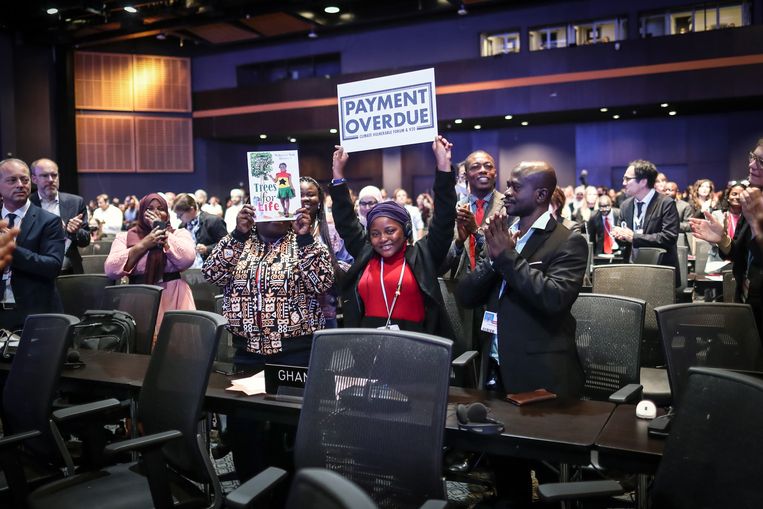A striking speaker took the stage at a packed meeting room at the climate summit in Egypt on Friday afternoon. A 10-year-old climate activist from Ghana, Nakeet Tramani, addressed the UN delegation heads. “My community in Ghana is paying a high price because our planet has been burned by so many.” Dramani read from a piece of paper with some difficulty at times. But she managed to forcefully formulate the most important question. “When can you pay us back?”
The climate summit in the seaside resort of Sharm-el-Sheikh was due to officially end on Friday afternoon, but was extended (as it is every year). The existing nearly two hundred UN Countries still disagree on hot-button issues, such as climate damage funding for floods caused by climate change.
The European Union, initially hesitant about climate damage funding, tried to break the deadlock on Thursday evening. European Commissioner Franz Timmermans appealed for the establishment of a fund, but he placed some conditions. Most important: Countries like China and Saudi Arabia must contribute. On paper they are still developing countries, so the UN for rich countries. No need to meet requirements.
The US remained silent after Timmerman’s proposal
The success of this climate summit – according to many, if the climate fund is set up – depends on China and the US on Friday evening. After Timmerman’s proposal, the US remained silent. The country was Not funny, says Bas Eickhout, head of the delegation of the European Parliament. The US, eager to be a guiding factor in key UN meetings, feels unconsulted and perhaps cornered. Historically, the country emits more greenhouse gases and is less willing than Europe to provide financial compensation for climate damage in vulnerable countries. A country with a well-known ‘claim culture’ (people often complain about it to each other) doesn’t want to pay for droughts and floods in Africa.
Earlier pledges for climate finance — 100 billion a year from rich countries to vulnerable countries — fell far short of the US. Although climate ambassador John Kerry has now agreed to set up a new fund, Europe doesn’t actually count on paying its fair share. “Even if Kerry wants it, he can’t get it through the Senate.”
That is why Europe insists that countries like China and Saudi Arabia should be among the payers and not the recipients of such climate damage funds. China on Friday evening clearly rejected the European idea and stuck to an earlier plan for a climate damage fund for more than 130 countries, where it would be on the receiving end of European money. There is also criticism of Europe from many countries, for example, because it initially wanted to compensate poor countries for climate damage, which means that Pakistan will fall by the wayside, precisely because this country is the face of climate damage. Movement. ‘It was a clumsy choice,’ admits Eickhout. Europe would be willing to put some effort into this.
The countries will hold talks with each other on Friday evening, and host country Egypt will have to come up with a structure for funding that everyone can live with. A difficult but not impossible task, for example, through the decision that funds will be created, but it still needs to be filled in on who exactly should pay.
Especially don’t take a step back
For many countries, including the United States and Europe, it is critical that this climate summit does not take a step back from previous years in terms of reducing greenhouse gas emissions and preventing global warming. Based on the draft text Egypt released on Friday, it is not yet clear whether it will succeed. At some points, the proposed text suggests little weakness. In particular, Europe wants the ‘phasing out of all fossil fuels’, not just coal, to be stated as a consensus objective. It also wants countries to raise their climate targets. The negotiating tables should show in the coming hours whether 1.5 degrees is alive not only on paper but also in practice.
On Friday night, the climate summit will lead to new funding for drought and floods and looks set to pass. ‘But the top can still fail,’ says Eickhout. Developing countries are rich countries’ old UN. If the standard is insisted on, the EU or the US are likely to block it, and the summit could end without a deal. But this has only happened once before.







